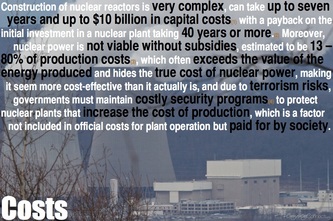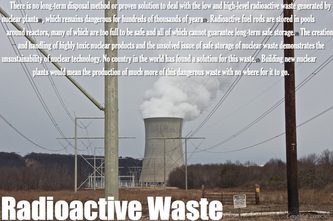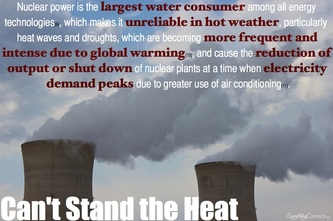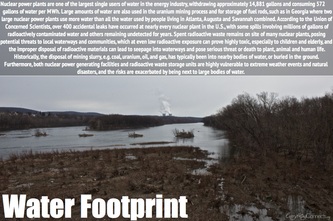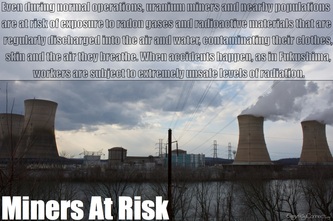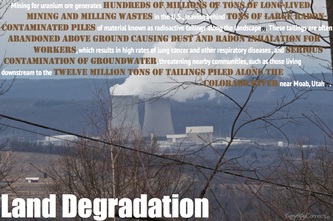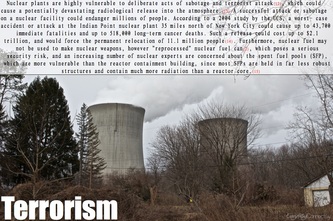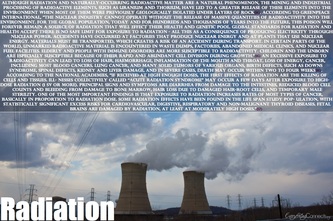Nuclear Power
Germany has vowed to close all of its nuclear reactors by 2022; Italy, which has voted overwhelmingly to become non-nuclear, Spain and Switzerland have all banned nuclear power; The International Energy Agency halved its estimate of additional nuclear generating capacity to be built by 2035; Austria was the first country to begin a nuclear phase-out in 1978; Japan has vowed to end its reliance on nuclear power by the 2030s; Belgium has vowed to phase out its nuclear energy sector, beginning with the shutdown of three of its oldest reactors by 2015; Taiwan and Mexico have called for a dramatic reduction in nuclear power; Australia, Austria, Denmark, Greece, Ireland, Italy, Latvia, Liechtenstein, Luxembourg, Malta, Portugal, Israel, Malaysia, New Zealand, and Norway remain opposed to nuclear power(The Economist)(Wikipedia). “For every dollar you spend on nuclear, you could have saved five or six times as much carbon with efficiency, or wind farms.” ~Benjamin Sovacool Learn more.
|
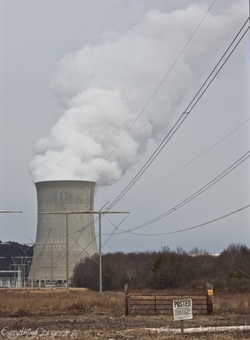
Nuclear power uses sustained nuclear fission to generate heat and electricity, providing about 5.7% of the world's energy and 13% of the world's electricity, with nearly 25% of the world’s nuclear reactors located in the US, making it the world’s leading producer of nuclear power with a net generation of approximately 799 million MWh in 2009. Proponents of nuclear energy, such as the World Nuclear Association, argue that nuclear power is a sustainable energy source which reduces carbon emissions, increases energy security, produces virtually no conventional air pollution and produces base-load power. However, missing from the seemingly perfect solution to modern-day energy problems are the unnecessary and unacceptable risks and costs associated with nuclear power. Nuclear technology will always be vulnerable to natural disasters, human error, design failures and terrorist attacks and is incredibly expensive and inherently unsafe as it can lead to irreparable damage to ecosystems, wildlife, and humans in the form of genetic mutations, birth defects, cancer, leukemia, disorders of the reproductive, immune, cardiovascular and endocrine systems, and more. Various scientific studies have shown an increased rate of cancer among people who live near nuclear power plants and long-term exposure to low-level radiation has shown to damage DNA. As the Sierra Club states, "As the disasters at Chernobyl, Three Mile Island and Fukushima have shown, nuclear power can cause catastrophic damage to land, human health, and our food supply. We should pursue our cleanest, quickest, safest, and cheapest energy options first: Nuclear power comes out last in every one of those categories." According to Kumi Naidoo in The New York Times, "While we have all heard of Chernobyl and Three Mile Island, the nuclear industry would have us believe these are but isolated events in an otherwise unblemished history. Not so. Over 800 other significant events have been officially reported to the International Atomic Energy Agency — Mayak, Tokaimura, Bohunice, Forsmark to name just a few." Furthermore, the well known and well respected 'Energy [R]evolution' study by Greenpeace and the European Renewable Energy Council clearly shows that a clean energy pathway is cheaper, healthier and delivers faster results for the climate crisis than any other energy pathway and according to the conservative International Energy Agency, even if existing nuclear power capacity could be quadrupled by 2050, this would reduce carbon dioxide emissions by less than 4 percent. With the right policies and investment in clean energy sources, we can power societies, create good jobs, and protect the environment with renewable energy, such as solar and wind, and achieve 100% renewable energy by 2050 in the US, without nuclear power. Learn more.
|
Nuclear Power Poses Many Serious Threats to People and the Environment
According to the Worldwatch Institute report, 'Nuclear Power in a Post-Fukushima World', "Annual renewables capacity additions have been outpacing nuclear start-ups for 15 years. In the United States, the share of renewables in new capacity additions skyrocketed from 2 percent in 2004 to 55 percent in 2009, with no new nuclear coming on line. The role of nuclear power is declining steadily and now accounts for about 13 percent of the world’s electricity generation and 5.5 percent of the commercial primary energy."
|
|
|
Nuclear power plant accidents rank first in terms of their economic cost, accounting for 41% of all property damage attributed to energy accidents.
Nuclear Accidents
According to Kumi Naidoo in The New York Times, "While we have all heard of Chernobyl and Three Mile Island, the nuclear industry would have us believe these are but isolated events in an otherwise unblemished history. Not so. Over 800 other significant events have been officially reported to the International Atomic Energy Agency — Mayak, Tokaimura, Bohunice, Forsmark to name just a few." View "Lists of Nuclear Disasters and Radioactive Incidents"
|
Chernobyl
The Fatal Flaws of Nuclear Power Fact Sheets by Public Citizen
|
Three Mile Island
|
Fukushima
The Fatal Flaws of Nuclear Power Fact Sheets by Public Citizen
|
"Even if it were climate-friendly, nuclear power could do little or nothing in the fight against global warming. Nuclear power is used only to generate electricity. It represents a mere 16% of the world’s electricity. Electricity itself only accounts for approximately one third of greenhouse gases. Nuclear power presents unacceptable risks to life on this planet: its small contribution to power is far outweighed by its inherent dangers. Nuclear power cannot deliver in the fight against global warming." ~Greenpeace International
|
Your browser does not support viewing this document. Click here to download the document.
Discover how instead of helping with global warming, nuclear power adds an unwanted radioactive dimension.
WWF: Climate Change and Nuclear Power
Your browser does not support viewing this document. Click here to download the document.
|
"It's ridiculous that time and time again we need a radioactive cloud coming out of a nuclear power-station to remind us that atomic energy is extraordinarily dangerous." ~Pierre Schaeffer
|
|
Learn More And Join The 'No Nuclear Movement'
|
Last Revised: 11/20/13
Commenting Rules |

